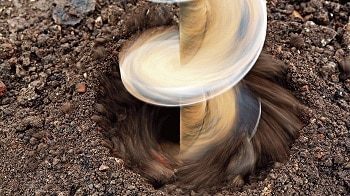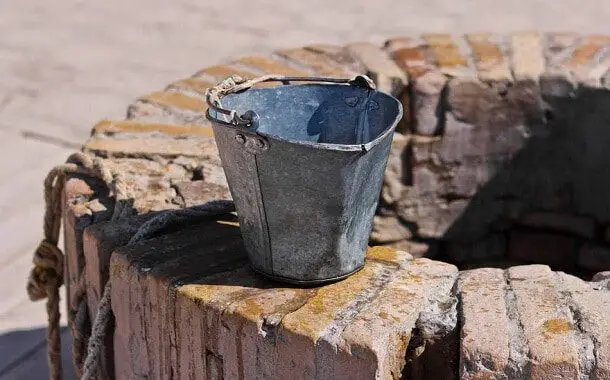How Much Does it Cost to Dig a Well?
Last Updated on February 27, 2024
Written by CPA Alec Pow | Content Reviewed by ![]() CFA Alexander Popinker
CFA Alexander Popinker
Installing a private well can be a significant but rewarding investment, providing your home with its own independent water supply. However, constructing a fully functioning well requires extensive planning, permitting, drilling, construction materials, pumps and filtration, and ongoing maintenance.
These numerous components add up to a total project cost typically ranging from $5,000 to $30,000 or more.
As a prospective well owner, having a realistic budget based on regional expenses is crucial before embarking on such an intensive project. By evaluating the most important variables that affect the overall price to dig and equip a well, you can make an informed decision on your ability to take on this major endeavor.
How Much Does it Cost to Dig a Well?
Broadly speaking, a typical household well often falls between $10,000 and $15,000 for a completed system, including drilling, construction, pumps, and basic setup. However, it’s important to understand why such a wide range exists.
On the low end, small diameter shallow wells around 50-100 feet in sandy soil with basic hand pumps can cost as little as $5,000 or less. But these low-price options may not be adequate for typical family water needs.
On the high end, costs for larger capacity 300-foot wells through bedrock with industrial pumps can exceed $30,000. In some cases with complex drilling requirements or high-volume needs, expenses can reach $50,000 or more.
Forbes, for example, reports that the cost of drilling a well can range from $10 to $25 per foot for shallow options with high water tables, while the cost for drilling can range from $20 to $30 per foot.
WTRFIT provides a chart showing the cost of drilling and digging wells, indicating that the cost can range from $20 to $30 per foot, with diggable wells costing as low as $3,000.
Culligan states that the cost of drilling a well can range from $1,500 to more than $30,000, with the average well drilling cost being around $5,000-$10,000.
The diameter of the well, materials used, and drilling depth most significantly impact the overall cost. Other major factors include:
- Local geology and soil conditions
- Groundwater depth
- Permitting requirements
- Water testing and potential treatment
- Well pump and filtration selections
- Installation equipment and labor rates
To gain a more detailed understanding, let’s break down each of these essential well construction expenses.
Factors That Affect the Price of Digging a Well
Two of the biggest factors determining total project pricing are the total depth of your well and the diameter or width of the well itself. This directly relates to how much actual digging and drilling must be done, how long it takes, and the well’s overall capacity.
For depth:
- Basic shallow wells of less than 100 feet cost $10-15 per foot drilled, as shallow digging is quicker and easier.
- Intermediate 100-300 foot wells cost around $15-50 per foot, becoming more expensive as specialized equipment and expertise is required to drill deeper.
- Very deep wells over 300 feet cost $50-100 per foot or more, involving reinforced casings and heavy machinery.
And for diameter:
- Small 2-3 inch diameter wells for limited use run $5-10 per foot.
- Standard 6-8 inch home wells run $15-30 per foot.
- High-capacity 10-12 inch wells cost $30-60 per foot.
As you can see, both depth and width combined result in dramatically different drilling expenses of hundreds or thousands of dollars. Consider both your home’s water needs and the local geology to determine adequate well dimensions.
Local Soil, Bedrock, and Groundwater
Beyond well dimensions, regional soil conditions, underground rock formations, and the local water table depth also affect the price. In areas with:
- Loose, sandy soils = faster drilling = lower costs
- Dense clay or consolidated bedrock = slower drilling = higher costs
- Deep water tables below 100 feet = deeper drilling required = higher costs
Factors like using a bedrock hammer attachment for drilling through solid rock can add $15-30 per foot versus standard methods. And crews may charge hourly rig fees for extended slow digging times.
Water Testing and Treatment
 To ensure your well provides safe, potable water, testing, and potential treatment add around $1,000 to $5,000 typically. Consider expenses like:
To ensure your well provides safe, potable water, testing, and potential treatment add around $1,000 to $5,000 typically. Consider expenses like:
- Basic bacterial testing = $150 per sample
- Chemical and mineral tests = $300+
- Annual or bi-annual retesting = $150 per round
- Sediment filters = $500
- Water softener system = $2,000+
- Iron removal system = $3,000+
- Chlorine or UV sterilizer = $200+
While not mandatory, filtration and regular testing provide peace of mind your well water is clean.
Durable, Code-Compliant Well Materials
Professional-grade well construction uses quality materials essential for safety, stability and longevity, at a cost of:
- Steel or thermoplastic well casing: $15-25 per foot installed
- Concrete/bentonite seals: $3-8 per foot
- Durable well cap and vermin-proof cover: $300-500
- Gravel packing around casing walls: $20 per cubic foot
Don’t cut corners here, or a collapsed well could result in costly repairs or replacement. Meet your local building codes too.
Pumps and Filtration
Expect $3,000 to $7,000 for a well pump and whole home filter setup, with pricing factors like:
- Submersible vs above-ground pump types
- Horsepower/capacity requirements
- Single or multi-stage external pump heads
- Tank sizes and pressure switches
- Built-in sediment and carbon block filtration
You might also like our articles about the cost of Kinetico Water Softeners, Lifesource water systems, or Culligan Water delivery.
This essential system pulls water from your aquifer and into your home plumbing network. Don’t underestimate needs here.
Professional Installation
Well drilling requires heavy, specialized rigs plus expertise best left to qualified pros. Their services typically run:
- Drilling rig rental fees: $150-$300 per hour
- Licensed well installers: $50-$125 per hour
- Necessary permits: $500 to $2,500
For a full well installation, you may pay $5,000 to $15,000 in professional service fees, but their specialized equipment and skills make it worthwhile.
Ongoing Maintenance and Repairs
While major well repairs are rare if construction is sound, expect to budget $300 to $1,500 annually for:
- Water testing and analysis
- System flushing and sanitization
- Checking pump flow and pressure
- Monitoring water levels and yield
- Adjusting filtration systems
- Minor part/repair replacement
Factor long-term maintenance costs into your overall budget. Water wells can function for decades if properly maintained.
Additional Cost Considerations
Beyond the absolute expenses of physical parts and installation, keep these other potential costs in mind:
- Increased electric bills from pumping: $100+ per month
- Property value impacts: Varies greatly by market
- Paperwork and regulatory compliance: Depends on jurisdiction
- Potential treatment for contamination: $1,000s if required
- Eventual replacement 20-50 years later: $15,000+
A complete cost/benefit analysis over the full lifespan will help make the best well decisions.
Work With Qualified Well Drilling Professionals
Budgeting for and coordinating all the steps to construct your own water well is not for the faint of heart. Unless you have prior experience, specialized tools, and a thorough understanding of local permitting, it is wise to hire professional well drilling services.
Licensed contractors bring the right equipment, expertise, and processes to handle your well project from initial survey to final inspection. They will also pull any required permits for you.
When selecting a well drilling company, look for extended experience specifically in your area, proven reputation, ability to explain technical specifications clearly, and reasonable transparent rates. Expect to pay $50 to $125 per hour for their services, based on your project scope.
Get quotes from at least 3 qualified drilling contractors before committing. Also ask if they offer maintenance contracts or warranties on their workmanship.
Final Words
As you can see from all the considerations above, digging even a modest well for residential needs often requires an initial investment between $10,000 to $15,000, with the potential to spend $20,000 or more for deeper wells with high-end pumps and filtration.
However, with careful planning, high-quality construction, and ongoing maintenance, your private well will provide a convenient supply of fresh household water for potentially decades into the future. This can make the considerable initial cost and effort a worthwhile endeavor.
Be sure to create a comprehensive budget upfront that covers all likely expenses. And partner with qualified pros to ensure your well is perfectly suited to your property’s geology and water needs. With reasonable expectations about the investment required, you’ll be able to reap the benefits of having your own private well for years to come.
Frequently Asked Questions
How long does it take to drill a 200-foot well?
For a 200-foot well, expect the actual drilling process to take 6-10 hours with a single professional drilling rig. However, constructing a complete operational well system requires 1-2 days including setup, water testing, well construction, pump installation, and cleanup.
Complex projects with large diameters or unconventional geology may take longer.
Is 100 feet deep enough for a residential well?
A depth of 100 feet is typical for many household wells, but optimal depth depends on soil conditions and depth to groundwater in your location.
In areas with thick dry soil or bedrock, wells may need to exceed 100 feet to reach an aquifer. Have a professional assess your property and recommend adequate depth.
Do deeper wells mean better water quality?
Not necessarily. While deeper wells can tap cleaner aquifers less prone to surface contaminants, water quality mainly depends on the surrounding soil and rock composition.
A shallower well in coarse clean sand/gravel can provide higher quality water than a deeper well in contaminated bedrock. Testing is crucial either way.


Thanks for telling me that it costs around $1500 to $7500 to build a well. I suppose a good contractor might be able to give me a good price for it. My husband has suggested that we should look for alternatives to our usual water supply since he heard from a neighbor that our area is prone to water shortages, so I thought that having a well might be a good alternative to have.
After experiencing a series of water interruptions in the past year, my parents have decided to consider having a well drilled at home. Thanks for providing an estimated cost on well drilling. You mentioned that it may cost roughly around $1,500 to $7,500 on water installation, electrical wiring, well drilling, and etc. However, I think this will be worth it for the family since we won’t have to experience any water shortage especially when we badly need it most.
Thanks for the tip that looking for relevant licenses can help me find the right water well installation contractor. I’m considering to have a well in my property in the future in order to have an alternative source of clean water that I hope would be potable as well. Being able to be a little bit more self-sufficient might be able to help me lessen my utility bills.